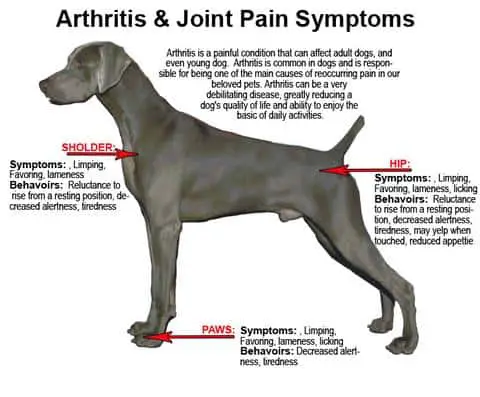Using CBD as an alternative to Prednisone can help your dog avoid the long term side effects that come with the extended use of both Prednisone & Prednisolone.
Cornell University recently published a study which concluded that …
80% of the dogs given CBD oil showed significant improvement in pain levels and quality of life… All without observable side-effects.
Unlike Prednisone, the key part of those findings are that CBD use comes “without observable side effects”
Prednisone certainly does work for some treatments…, but it’s the long term side effects of prednisone that many dog and pet owners should be aware of.
In this article, we break down the ‘pros and cons’ of the popular pet prescribed drug named prednisone as well as using CBD oil as a natural alternative.
Most Common Reasons Why Dogs Get Prescribed Prednisone.
Prednisone is commonly prescribed medicine for dogs and sometimes for humans as well.

Prednisone is a type of ‘synthetic steroid‘ (not naturally produced by the body) known as a ‘cortico-steroid‘.
Because of their anti-inflammatory properties, ‘cortico-steroids’ such as Prednisone are valuable medications.
Prednisone is commonly prescribed to dogs to treat conditions with mild inflammation or to suppress inflammation from an allergic rash.
Prednisone is Also Commonly Prescribed to Dogs For:
- Arthritis
- Joint pain (typically caused by arthritis)
- Skin diseases or rashes such as eczema, dermatitis or itchy skin
- Allergic reactions
- Lupus
- Asthma
- Anaphylactic shock
- Addison’s disease
- Disorders of the central nervous system
- Prednisolone is used to treat liver conditions
- Cancers such as lymphomas
‘Tail’ of Caution:
According to Dr. Demian Dressler, author of the Dog Cancer Survival Guide…,
Veterinary overuse of Prednisone has given this class of ‘cortico-steroid’ drugs a bad rap…
Many diseases can be better managed with less serious drugs, but some Vets are too quick to reach for the ‘fast-fix’….
Because of this…a significant number of dogs experience Prednisone’s serious side effects when in reality, they really don’t need to.
What Are The Side Effects of Prednisone
Prednisone reduces inflammation by reducing immune system activity.
The down side to ‘cortico-steroids’ such as Prednisone, is that by reducing immune system activity, it makes your dog more likely to getting other infections.
Because of this side effect it leaves many pet owners looking for alternatives to prednisone for their dogs.
Prednisone For Dogs: Short Term Side Effects
For the first week or two, Short-term side effects are experienced when your dog is initially placed on a corticosteroid.
Short-term side effects generally include:
- Increased thirst and urination
- Increased hunger
- Panting (especially dogs)
- General loss of energy
- Development or worsening of infections (especially bacterial skin infections)
- Vomiting or nausea (less common)
If your dogs gets any of these side effects, they can often be reduced or eliminated by lowering the prednisone dosage or frequency that it’s being taken.
The objective when prescribed prednisone is to determine the lowest dose of medication that controls the condition with the least number of side effects.
In other words….It’s a careful balance between risk & reward
As a result of risk-reward balancing act, when it comes to fighting pain, inflammation, and skin rashes, many dog owners are turning to a ‘side effect free’ alternative to prednisone such as CBD.
Prednisone For Dogs: Long Term Side Effects
Dogs with long term conditions like chronic arthritis will require longer treatment regimens.
But when corticosteroids are used for more than 3-4 months, especially with larger doses, additional side effects become more of a concern.
The most commonly seen long-term side effects include:
- Urinary Tract Infections (UTI’s) in up to 30% of patients. Pets receiving steroids will not experience the usual symptoms of urinary tract infection because the steroid will suppress the inflammation and discomfort commonly associated with a UTI. In many cases dogs have to give a urine culture in order to detect the infection.
- Development of thin skin, blackheads, and a poor or thin hair coat or hair loss
- Lowered ability to naturally heal wounds
- Development of obesity due to increased hunger
- Muscle weakness secondary to protein catabolism (breakdown)
- Development of hard plaques or spots on the skin called calcinosis cutis. These plaques are the result of calcium deposition in the skin.
- Increased susceptibility to opportunistic or secondary bacterial infections
- Increased susceptibility to fungal infections (especially of the nasal cavity)
- Development of adult onset demodectic mange.
- Predisposition to diabetes mellitus
If your dog is prescribed Prednisone for a chronic condition such as arthritis or eczema its important to weigh the long term risks vs. rewards.
In many cases the long term risks can outweigh the reward.
Having said that, many Vets are not up to date on the current research, but Prednisone is not the only option.
CBD For Dogs: A Natural (and side effect free) Alternative to Prednisone
According to research, many conditions in which dogs are treated with prednisone, can also be naturally treated with cannabidiol (CBD).

For Example:
- Arthritis
- Joint Pain from Arthritis & Inflammation
- Skin conditions / Rashes
- Immune System Disorders
CBD for Dogs: Arthritis and Inflammation
In one of the most recent studies published in 2020 on ScienceDAILY.com…
Researchers at Baylor College of Medicine conducted studies to assess the effects of cannabidiol (CBD) for arthritic pain in dogs….,
And the results could lead the way to studying CBD’s effect in humans.
“We found encouraging results,” Dr. Halpert said….
“9 of the 10 dogs on CBD showed benefits, which remained for two weeks after the treatment stopped. “
“under the conditions of our study, the treatment seems to be safe.”

CBD vs. Osteoarthritis:
Osteoarthritis is caused by the ‘wearing down’ of cartilage… this intern, leads to inflammation…. Osteoarthritis cannot be cured, but it can be managed….
CBD studies on dogs conducted by Cornell University concluded that “dogs with OA (osteo-arthritis) receiving CBD were (found) to be more comfortable and active”.
According to Dr. Debra Rose Wilson, PHD from Medical News Today
“At a time when we are trying to reduce the use of pain relievers, CBD oil can be an effective approach to managing the pain of arthritis.”
Dr. Rose continues to say that “Researchers have also recognized the role that CBD could play in reducing the [underlying cause &] pain-causing inflammation of arthritis.”
CBD treats Osteoarthritis by reducing both the inflammation response & the associated pain.
CBD vs. Polyarthritis
Inflammatory Joint Disease (AKA Polyarthritis) can also be effectively managed by using CBD.
Poly-Arthritis, is caused by an internal ‘bodily response’ which in-turn causes the immune-system to attack its own tissue in the joints.
In response to the ‘overstimulated’ response by the immune system, CBD interacts naturally with Endo-cannabinoid receptors.
The endo-cannabinoid system helps to ‘naturally regulate’ immune system responses (but not necessarily suppress it).
This relationship between CBD, the endo-cannabinoid system, and the immune system, is why CBD works well for symptoms of rheumatoid arthritis in humans & poly-arthritis in dogs.
The best thing about CBD is that it’s natural, organic & comes with minimal to no side effects.
Bottom Line Summary: CBD has beyond a scientific doubt been proven to reduce & improve arthritis symptoms in multiple canine studies.
CBD Vs. Dogs Skin Conditions (eczema)
CBD not only helps relieve the symptoms of certain skin irritations, like eczema (atopic dermatitis)…, but studies have also shown that CBD can help with regenerating healthy cell growth…
According to National Eczema.org
“With measurable anti-itch, anti-pain, anti-microbial and anti-inflammatory properties, the effect of cannabinoids (such as CBD) in patients with AD (Atopic Dermatitis AKA Eczema) has already begun to be demonstrated.”
You can see an example of ‘CBD at work’ for a skin rash on a small pup that we recommended CBD for.
Last year at the annual American Academy of Dermatology Meeting…,
Jeanette Jacknin, MD gave an hour long presentation on the benefits on CBD for skin health….During the presentation she concluded that
“There are studies documenting the anti-inflammatory properties of topical CBD”….
She also touted the effectiveness of “topical cannabinoids (such as CBD) working on acne, eczema, and psoriasis”
What Exactly is CBD?
CBD is short for Cannabidiol and is 1 of over 100, completely organic & 100% naturally occurring, compounds produced by the Cannabis plant

CBD was made federally legal in 2018 and NOPE, it doesn’t get you or your dog ‘high‘.
These 100+ different organic compounds produced by the cannabis plant are called Cannabinoids…
(THC & CBD are the most famous cannabinoids)
All mammals, including humans (and dogs), produce cannabinoids naturally within the body.
Cannabinoids interact with a network of receptors that are part of the Central Nervous System known –
This network of receptors is known as the Endo-Cannabinoid System.
The Endo-Cannabinoid System is one of our most important internal bodily systems & is responsible for maintaining many functions within the body.
The ‘endo-cannabinoid system’ works similar to a thermostat in a house…
If the temperature in a room is too hot…., the thermostat goes into ‘cooling mode’ –
If your immune system is over-extended on an allergic rash, the endo-cannabinoid system ‘kicks in’ to normalize the response levels.
How Does The Endo-Cannabinoid System Work ?
CBD commonly ineracts with 2 specific types of ‘endo-cannabinoid receptors’.
Cannabinoid Receptors Type 1 (CB1) – CB1 receptors are a critical piece of our central nervous system and are most heavily concentrated in our brain and spinal cord.
Cannabinoid Receptors Type 2 (CB2) – CB2 receptors are mainly concentrated in the various parts of the immune system, the skin cells and most internal organs.
Because of the wide reach of CB1 & CB2 receptors in the EndoCannabinoid System, CBD has a wide range of health benefits which are currently being studied.
CBD’s is currently being studied to treat pain, inflammation, anxiety, immune system disorders such as eczema & psoriasis, brain injuries, PTSD & more.
Put simply into a visualization… CBD interacts with both CB1 & CB2 receptors as well as other receptors in the body sort of like fitting a key into a lock, or like Cinderella’s foot into a glass slipper.
CBD Oil for Dogs: a Natural Prednisone Alternative
For an arthritis condition, CBD oil or CBD treats taken orally are most effective.
CBD is most effective after it is able to accumulate in the blood stream for a couple of weeks….This is known as the ‘Cumulative Effect”
For a skin condition, a topical lotion or sprays are effective… and even more effective when combined with CBD oil taken orally.
Taking CBD and Prednisone Together: Is It Safe?
Many Dog owners are asking
“Can my dog take CBD oil with prednisone”
Mixing CBD and Prednisone for dogs may not be the best idea.
CBD oil can interact with prednisone, making side effects more likely. Veterinary Doctors don’t consider them safe to take together.
If your dog suffers from an inflammatory condition and you want to try CBD, you should first wean off prednisone. However, you must do this carefully and under the supervision of your vet.
Here’s what you need to know if you are thinking switching your dog from prednisone to CBD.
Discontinuing Use of Prednisone in Dogs
If your dog is currently taking prednisone and you decide that it may not be the right choice for you, be aware that side effects may occur if you suddenly discontinue your dog’s use of it.
According to 1-800-PetMeds Stopping use abruptly can cause an abrupt increase in joint pain, body aches, nausea, and fatigue.
In order to avoid any discomfort, you want to wean your dog off prednisone slowly.
According to experts, tapering off of a prednisone treatment typically takes between two and five weeks.
Final Thoughts
Whether you’re using Prednisone, or an alternative such as CBD oil for your dog, make sure to do your due diligence on the long term effects of both options.
Always speak to your Vet, but understand that because CBD has only been legalized since 2018, some Vets are not up to date on the latest science behind CBD.
Ultimately you know your dog better than anyone and it’s up to you to make the best decision in the best interest of your dog….
Each situation is different & only you know what is best for your pup’s long term health.
On a personal note, my chocolate lab Jamaica passed away a few years back due to liver complications from an arthritis medicine she was taking….
If CBD was available at the time, or if I had known about it, taking CBD could have likely helped her arthritis and ultimately extended her life’s journey.
Check Out Out Our Other Interesting Articles About CBD…
- Using Psilocybin and CBD To Quit Addictions
- What’s the Difference: Marijuana vs. Cannabis vs. CBD vs. THC vs. Hemp ?
- CBD vs Xanax: CBD As A Natural Alternative to Xanax for Anxiety
- CBD Oil Praised As Natural Remedy for Mental Wellness
- This Is The Reason Why CBD (Might) Show Up On Your Drug Test ?
- DON’T Buy CBD On Amazon: Here’s Why
- Using CBD To Quit Weed: The Science (and my experience)
- CBD vs. Zoloft: A Natural Alternative For Anxiety?
- Why Does Weed Make (Some) People Feel Paranoid ? Cannabis Explained
- Why Is Cannabis (still) Illegal in the United States ?
- CBD As a Prednisone Alternative For Dogs
Loved what you read?
Hit that share button and let the world in on the secret – we’d be thrilled!
Got thoughts? We’re all ears for your feedback, corrections, or a good old chat. Don’t be shy; drop us a line.
And hey, don’t miss out on our curated list of must-reads in the recommended books section.
Big thanks for diving in with us today!


